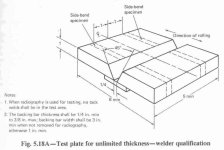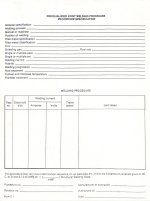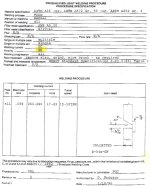otlski
Gold Member
Here is an off-topic post that I am hoping is okay. Unfortunately it has nothing to do with my play (the tractor) but has to do with my work.
I am looking for guidance. My company has a contract with one of the major primes. The deliverable is for a center of gravity measurement (our core competency) ground support apparatus. I have culled the following welding verbiage from our customer's SOW.
2.1 Applicable Documents
The following sections provide a listing of the applicable documents. Documents invoked in sections 3 and 4 of this document and not included in section 2 shall be considered applicable documents (unless noted as reference only).
AWS B2.1 Standard for Weld Procedure and Performance Qualification
AWS D1.1 Structural Welding Code, Steel
There are actually many more call outs but they either do not apply to welding, or apply to other materials (aluminum) or processes (brazing), or they apply to weld inspection by third party sources.
Later in their SOW, they make this statement.
3.4.8.1 Welding
Welding of SE shall be in accordance with AWS Standards and Specifications.
Note: Refer to section 2.1 for applicable documents.
I am attempting to interpret B2.1 and D1.1 and rightfully or wrongfully have perhaps reached some understanding. Please tell me where I am right, wrong, or missing something crucial. Although I have one tricky assembly where ASTM A500 is welded to 4340 steel, I am not worried about that one. I have a vendor out of state that can do the work. My immediate concern is the commodity welding where we are joining ASTM A500 to ASTM A500 or to ASTM A36. You see my long trusted local welding outfit does not meet my customer's requirements.
Specifically I believe from D1.1 either his company, and/or his welding personnel have to have a certification. When vetting alternate sources, do I ask if the personnel have the certs or the company holds them?
Can a welding outfit that does not have the certs, or guys holding that cert, hire an outside expert to stamp the work?
If our work can be re orientated to facilitate "easy" positions do the certs and thus the choices of companies and personnel open up? Is it common to find personnel only qualified for say non vertical work?
Am I correct in assuming that B2.1 is for general and specific guidance for someone who already holds a cert under D1.1? And, that B2.1 has no provisions for certification holders unto itself?
Is there an expiration date on said certs?
To meet my customer's SOW what is your interpretation of what I need to vet?
In the end, I really need a partner throughout this process. My junior mechanical engineer is not all that familiar with welding and it is not my area of expertise aside from hacking a box blade repair or similar. We need a welder that can help us make appropriate decisions, and I need a way to decide if they are competent to do so.
I am looking for guidance. My company has a contract with one of the major primes. The deliverable is for a center of gravity measurement (our core competency) ground support apparatus. I have culled the following welding verbiage from our customer's SOW.
2.1 Applicable Documents
The following sections provide a listing of the applicable documents. Documents invoked in sections 3 and 4 of this document and not included in section 2 shall be considered applicable documents (unless noted as reference only).
AWS B2.1 Standard for Weld Procedure and Performance Qualification
AWS D1.1 Structural Welding Code, Steel
There are actually many more call outs but they either do not apply to welding, or apply to other materials (aluminum) or processes (brazing), or they apply to weld inspection by third party sources.
Later in their SOW, they make this statement.
3.4.8.1 Welding
Welding of SE shall be in accordance with AWS Standards and Specifications.
Note: Refer to section 2.1 for applicable documents.
I am attempting to interpret B2.1 and D1.1 and rightfully or wrongfully have perhaps reached some understanding. Please tell me where I am right, wrong, or missing something crucial. Although I have one tricky assembly where ASTM A500 is welded to 4340 steel, I am not worried about that one. I have a vendor out of state that can do the work. My immediate concern is the commodity welding where we are joining ASTM A500 to ASTM A500 or to ASTM A36. You see my long trusted local welding outfit does not meet my customer's requirements.
Specifically I believe from D1.1 either his company, and/or his welding personnel have to have a certification. When vetting alternate sources, do I ask if the personnel have the certs or the company holds them?
Can a welding outfit that does not have the certs, or guys holding that cert, hire an outside expert to stamp the work?
If our work can be re orientated to facilitate "easy" positions do the certs and thus the choices of companies and personnel open up? Is it common to find personnel only qualified for say non vertical work?
Am I correct in assuming that B2.1 is for general and specific guidance for someone who already holds a cert under D1.1? And, that B2.1 has no provisions for certification holders unto itself?
Is there an expiration date on said certs?
To meet my customer's SOW what is your interpretation of what I need to vet?
In the end, I really need a partner throughout this process. My junior mechanical engineer is not all that familiar with welding and it is not my area of expertise aside from hacking a box blade repair or similar. We need a welder that can help us make appropriate decisions, and I need a way to decide if they are competent to do so.
Last edited:


